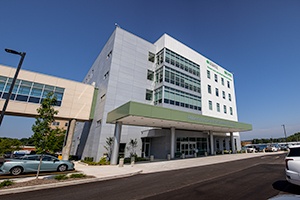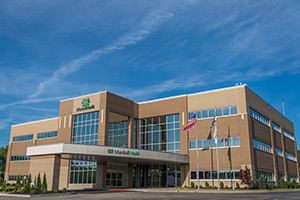Headaches can differ significantly in location, frequency, duration and severity. While more than 40 million individuals in the U.S. suffer from migraine attacks, very few of those individuals pursue care and are, instead, left with debilitating attacks that interfere with their quality of life. Other patients may not have migraine attacks and do not realize there are care options for their headache types as well. All individuals with headaches may benefit from specialized care with individualized treatment plans.
At Marshall Neurology, we provide innovative, personalized treatments to help patients manage their headache disorders and reclaim their lives.
If you are experiencing new headache attacks or have 4 or more days/month affected by headache symptoms or pain, you should see a specialist. Many times, patients do not realize that early intervention can decrease the risk of worsening attacks over time. A headache specialist can help provide a proper diagnosis and develop a comprehensive treatment plan for you.
Primary headaches include:
We also treat other headache and facial pain conditions, including:
At your initial appointment, you will be asked to describe your headaches in detail. Patients are also encouraged to keep a headache diary and bring it to their first appointment. Items to track in your journal include frequency, duration, severity and medications taken to abort the attack.
We provide comprehensive care for a wide range of headache conditions, including:
Options include:
At Marshall Neurology, we take a multidisciplinary approach to headache care. Our team collaborates with specialists in neurosurgery, ophthalmology, otolaryngology, psychiatry, pain medicine and radiology to provide comprehensive evaluations and individualized care plans.
We consider each patient’s unique headache history, lifestyle and co-existing medical conditions. When necessary, we coordinate diagnostic imaging and additional testing to ensure an accurate diagnosis and effective treatment plan.
Clinical Interests:
Locations:
Clinical Interests:
Locations:
Clinical Interests:
Locations:

A provider-based department of Cabell Huntington HospitalRobert and Lena Shell Medical Pavilion1340 Hal Greer Blvd.
Building 2, Fourth Floor (Suite #4000)
Huntington, WV 25701
Phone: 304.691.1787

An outpatient department of Cabell Huntington Hospital
Marshall Health - Teays Valley Main Building
300 Corporate Center Drive
2nd Floor
Scott Depot, WV 25560
Phone: 304.691.6931
Take the first step toward controlling your headaches. Contact Marshall Neurology to schedule an appointment with our team of specialists.
Marshall Neurology
304.691.1787